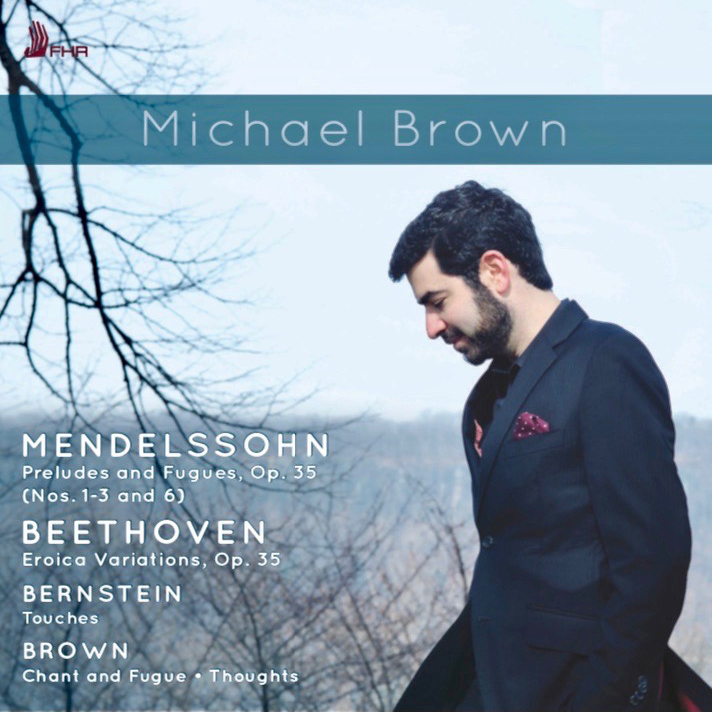By Jonathan Blumhofer, The Arts Fuse
May 1, 2018
» Original Link

Variations and fugues are the overriding themes of pianist/composer Michael Brown’s captivating new album (on First Hand Records) that pairs his own music with pieces by Leonard Bernstein, Felix Mendelssohn, and Beethoven.
Brown is represented by three short pieces that total just under seven minutes of music. Two movements from his Piano Suite – “Chant” and “Fugue” – offer, respectively, plaintive, floating lyricism and spiky, energetic gestures. The stand-alone Thoughts is, essentially, a short song for solo keyboard.
Together, they reveal a composer who’s perfectly at home writing affecting miniatures for the piano, ones that brim with personality and sometimes head off in surprising directions. The “Fugue,” for instance, is a spirited discussion on an angular motive that builds in intensity only to peter out in Ives-ian fashion. And the closing bars of Thoughts fade ominously.
The three Brown scores also offer a nice contrast to Bernstein’s Touches, a set of variations on a bluesy theme that has been largely neglected since it was written in 1981 but seems to be undergoing a renaissance of late; Brown’s recording is at least the third to come out in the last twelve months.
And it’s an excellent one, gleaming and full of vim. The pianist easily navigates the music’s considerable demands, paying special heed to the score’s copious dynamic and articulation instructions. Paradoxically, the strength of Brown’s interpretation tends to emphasize some of Touches’ structural shortcomings (like the austere brevity of some of its middle variations). But he imbues its biggest moments (the searching fifth variation, epic Coda) with heat.
Framing the album’s American contributions come a gripping account of four of Mendelssohn’s six Preludes and Fugues, op. 35, and Beethoven’s Eroica Variations (his op. 35).
Brown dispatches the Mendelssohn’s sometimes very knotty chromaticism with exceptional clarity and – always – a strong sense of the musical line. Thus, the fugues are anything but pedantic, pseudo-Bachian exercises: Brown’s account of the opening E-minor one, for instance, is packed with energy and drama, the chorale at its end not only perfectly balanced between the hands but, emotionally, truly cathartic. The concluding sixth fugue (in B-flat major) is a marvel of propulsion and snappy rhythmic activity.
Brown also mines much beauty and drama out of the preludes. The E-minor Prelude is plenty turbulent (and exquisitely voiced). The D-major floats dreamily, while the B-minor flits by nimbly. Best is the luminous, rather Lisztian B-flat-major Prelude, whose thick, chordal accompaniments never drag down its lyrical main tune.
The Eroica Variations sound appropriately heroic here and Brown revels in their quirks – the cadenza in the second variation and seventh-variation canon with thudding bass interjections speak with real wit – as well as their anticipations of things to come (like the eighth variation’s anticipations of the Waldstein Sonata’s finale’s textures).
This is an altogether smart and enjoyable release.

© Michael Brown, All Rights Reserved. Site by ycArt design studio